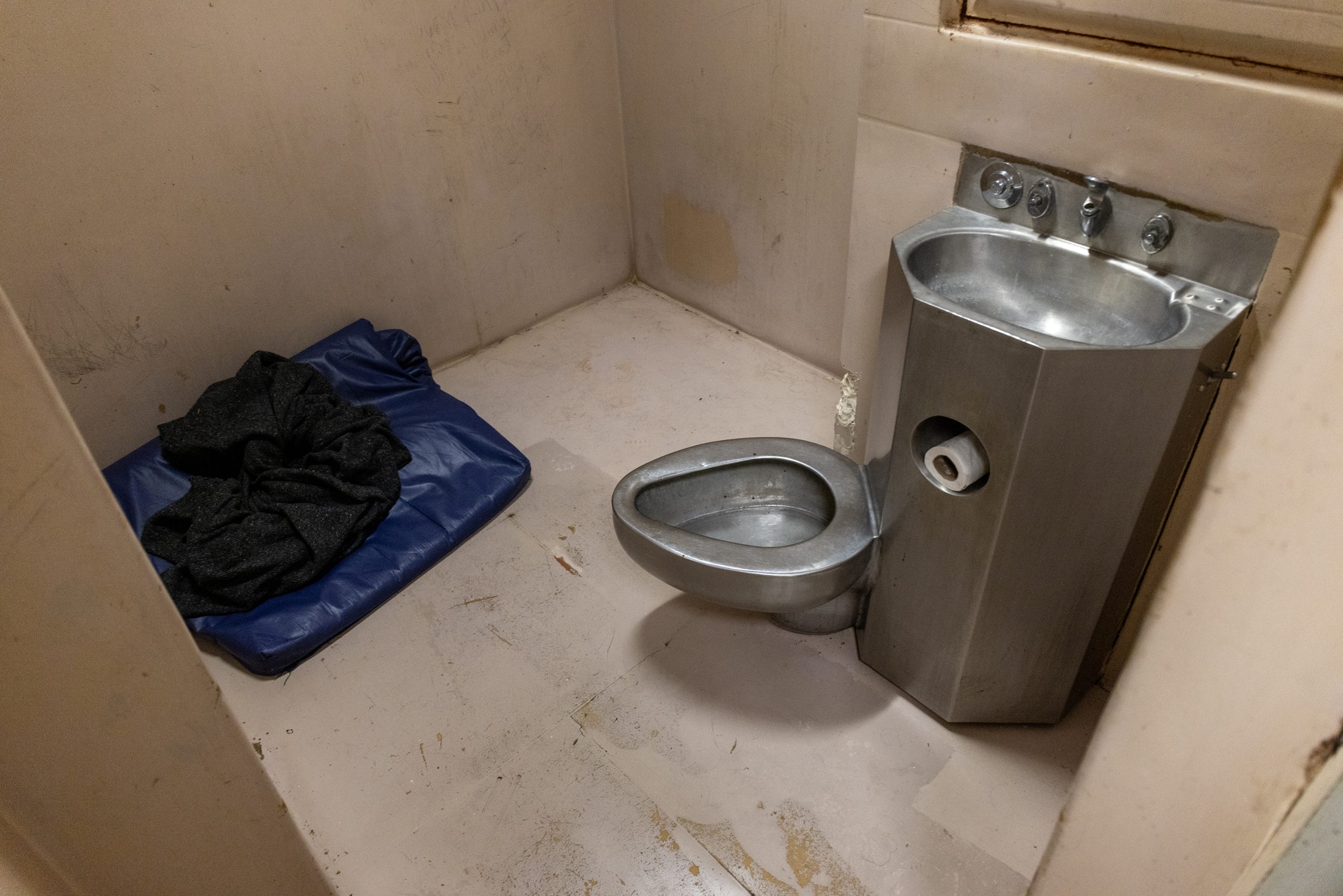Mississippi Today
Incarcerated Mississippians with mental illness face nation’s second-longest wait for care

Mississippians who need mental health treatment before they can stand trial have to wait in jail longer than people in any other state but Texas, according to a new national study by the nonprofit Treatment Advocacy Center.
But the Department of Mental Health says a new 83-bed forensic facility scheduled to open later this year will drastically reduce wait times. It's asking for $9.5 million from the Legislature to fully staff the facility and will open as many beds as it can with whatever funding it receives.
Forensic beds are reserved for people with a mental illness who have been charged with a crime and require treatment before they can stand trial, and for people who have been found not guilty by reason of insanity.
The report found that people in Mississippi who require competency restoration services wait an average of 9.6 months after a court has ordered them into treatment before being admitted to a state hospital. The only state where people waited longer was Texas, with an average wait of 1.2 years.
Adam Moore, spokesman for the Department of Mental Health, said the agency has been working to improve forensic services, and the new unit could make a huge difference.
“If the new building were opened and fully staffed today, there would be very few individuals waiting for competency restoration in jail, and because the number of competency restoration beds would increase so dramatically, the wait times would be significantly reduced for those who weren't admitted immediately,” he said in an email.
Mississippians awaiting competency restoration are often incarcerated for months in county jails that typically offer little in the way of mental health services. For sheriffs, housing and protecting them can be a major challenge.
In September, Adams County Sheriff Travis Patten offered a tour of the jail he runs. He has been sounding the alarm about dangerous conditions in the jail for years. In 2022 the nonprofit protection and advocacy organization Disability Rights Mississippi informed the county it planned to investigate, saying jail conditions were “simply put, deplorable and inhumane for any individual.”
Most people facing charges in the county are sent across the river to the jail in Concordia Parish, Louisiana. But that jail won't accept people with serious mental illness, so the crumbling jail in downtown Natchez detains people waiting for treatment through the forensic or civil process.
In September, one of the jail's two padded cells had been occupied for six months by a man awaiting forensic services.
“Jailers don't get paid very much here,” he said. “But yet what the community is wanting is for them to be psychiatric nurses, and they are not equipped to do that.”
The report by the Treatment Advocacy Center, which conducts research and lobbying aimed at making it easier for people with mental illness to get treatment, reviewed the availability of state hospital beds for psychiatric treatment around the country. The organization found the number of such beds reached a “historic low” last year, following decades of policy aimed at reducing the number of people with mental illness and developmental disabilities who are treated in institutions such as state hospitals.
The report also tallied beds available to people who have been ordered by a judge to receive psychiatric treatment through the civil commitment process. Unlike those awaiting forensic beds, such people haven't been charged with a crime. But Mississippians going through the civil commitment process are frequently detained in jail, sometimes for days or weeks at a time, Mississippi Today and ProPublica reported last year. They are generally treated like criminal defendants and often unable to access prescribed psychiatric medications.
Since 2006, at least 14 people have died after being jailed during the civil commitment process.
Mississippi is a national outlier: Mississippi Today surveyed behavioral health officials and advocates in all 50 states to find that in no other state are people routinely jailed without criminal charges for days or weeks while they await civil commitment proceedings.
Mississippi officials involved in the commitment process often say they have to jail people because they have nowhere else to put them. But the Treatment Advocacy Center report found that Mississippi actually has more beds for such patients than most states: Mississippi has 9.8 civil beds for every 100,000 residents, more than all but six states and well above the national average of 5.2.
That finding suggests that a lack of treatment beds is not the core reason that Mississippi officials jail people solely because they may be mentally ill.
Polly Tribble, executive director of Disability Rights Mississippi, which advocates for the rights of people with disabilities including serious mental illness, said that in Mississippi, deinstitutionalization has not been accompanied by the development of effective community-based mental health services. Those services could help people stay stable so that they don't need inpatient treatment or behave in ways that lead to criminal charges.
“You're either going to the hospital or jail,” she said. “But if we could cut it off, before that, and help people stay at home, and stay in their community and get better, then we could fix it at the jail and the state hospital levels.”
The Treatment Advocacy Center report also found that the number of state hospital beds in the state dropped by 31% from 2016 to last year. That decline was in part a response to a 2016 lawsuit by the Department of Justice alleging that Mississippi discriminated against people with mental illness by failing to provide services at the community level and instead forcing them into state hospitals.
Since then, the agency has shifted resources from the state hospitals to the community mental health centers that operate local services, including crisis stabilization units with beds that were not counted in the Treatment Advocacy Center report.
But the federal lawsuit is over, and the remedial order that required the state to expand community services has been overturned.
Department of Mental Health director Wendy Bailey told lawmakers on Wednesday that the agency remains committed to expanding community-based services.
This article first appeared on Mississippi Today and is republished here under a Creative Commons license.
Mississippi Today
On this day in 1896


MAY 18, 1896

The U.S. Supreme Court ruled 7-1 in Plessy v. Ferguson that racial segregation on railroads or similar public places was constitutional, forging the “separate but equal” doctrine that remained in place until 1954.
In his dissent that would foreshadow the ruling six decades later in Brown v. Board of Education, Justice John Marshall Harlan wrote that “separate but equal” rail cars were aimed at discriminating against Black Americans.
“In the view of the Constitution, in the eye of the law, there is in this country no superior, dominant, ruling class of citizens,” he wrote. “Our Constitution in color-blind and neither knows nor tolerates classes among citizens. In respect of civil rights, all citizens are equal before the law. The humblest is the peer of the most powerful. The law … takes no account of his surroundings or of his color when his civil rights as guaranteed by the supreme law of the land are involved.”
This article first appeared on Mississippi Today and is republished here under a Creative Commons license.
Did you miss our previous article…
https://www.biloxinewsevents.com/?p=359301
Mississippi Today
Renada Stovall, chemist and entrepreneur
Renada Stovall sat on the back deck of her rural Arkansas home one evening, contemplating life when she had a life-altering epiphany…
“I gotta get out of these woods.”
She heard it as clear as lips to her ear and as deep as the trees surrounding her property. Stovall's job as a chemist had taken her all over the country. In addition to Arkansas, there were stints in Atlanta, Dallas and Reno. But she was missing home, her parents and friends. She also knew, she needed something else to do.
“I thought, what kind of business can I start for myself,” said Stovall, as she watered herbs growing in a garden behind her south Jackson home. Some of those herbs are used in her all-natural products. “I know when I lived in Reno, Nevada, where it's very hot and very dry, there really weren't products available that worked for me, my hair, and my skin suffered. I've got a chemistry degree from Spelman College. I took the plunge and decided to create products for myself.”

In 2018, Stovall's venture led to the creation of shea butter moisturizers and natural soaps. But she didn't stop there, and in December 2022, she moved home to Mississippi and got to work, expanding her product line to include body balms and butters, and shampoos infused with avocado and palm, mango butter, coconut and olive oils.
Nadabutter, which incorporates Renada's name, came to fruition.

Stovall sells her balms and moisturizers at what she calls, “pop-up markets,” across the state during the summer. She's available via social media and also creates products depending on what of her ingredients a customer chooses. “My turmeric and honey is really popular,” Stovall added.
“The all-natural ingredients I use are great for conditioning the skin and hair. All of my products make you feel soft and luscious. The shea butter I use comes from West Africa. It's my way of networking and supporting other women. And it's my wish that other women can be inspired to be self-sufficient in starting their own businesses.”





This article first appeared on Mississippi Today and is republished here under a Creative Commons license.
Mississippi Today
On this day in 1954
MAY 17, 1954

In Brown v. Board of Education and Bolling v. Sharpe, the U.S. Supreme Court unanimously ruled that the “separate but equal” doctrine in Plessy v. Ferguson was unconstitutional under the 14th Amendment, which guaranteed equal treatment under the law.
The historic decision brought an end to federal tolerance of racial segregation, ruling in the case of student Linda Brown, who was denied admission to her local elementary school in Topeka, Kansas, because of the color of her skin.
In Mississippi, segregationist leaders called the day “Black Monday” and took up the charge of the just-created white Citizens' Council to preserve racial segregation at all costs.
This article first appeared on Mississippi Today and is republished here under a Creative Commons license.
-
SuperTalk FM6 days ago
Martin Lawrence making 3 stops in Mississippi on comedy tour
-
Our Mississippi Home5 days ago
Beat the Heat with Mississippi’s Best Waterparks
-
SuperTalk FM2 days ago
State auditor cracking down on Mississippians receiving unemployment benefits
-
Our Mississippi Home6 days ago
Charlie’s U-Pik: Opening Soon for the Summer Season
-
Mississippi News Video4 days ago
Jackson has a gang problem
-
Kaiser Health News5 days ago
Medicaid ‘Unwinding’ Decried as Biased Against Disabled People
-
Local News1 day ago
Family files lawsuit after teen’s suicide in Harrison County Jail
-
Mississippi Today3 days ago
On this day in 1950







































